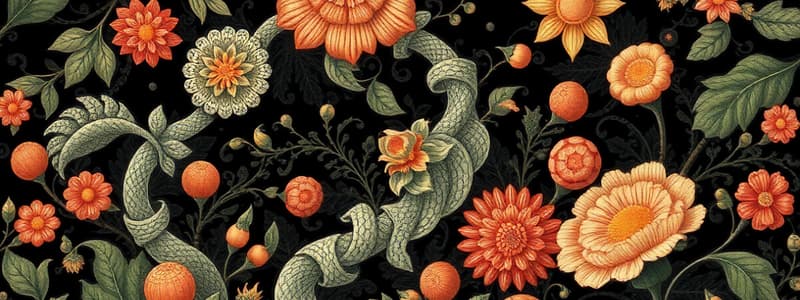Podcast
Questions and Answers
What is the primary distinguishing feature of fats?
What is the primary distinguishing feature of fats?
- They are characterized by their greasy feel (correct)
- They can mix easily with water
- They are sweet and crystalline
- They contain Nitrogen in their molecules
What component differentiates proteins from fats and carbohydrates?
What component differentiates proteins from fats and carbohydrates?
- The presence of Nitrogen (correct)
- The ability to mix with water
- The higher calorie content
- The absence of carbon
Which sugar is known as the sweetest of natural sugars?
Which sugar is known as the sweetest of natural sugars?
- Fructose (correct)
- Glucose
- Sucrose
- Galactose
Which type of molasses is characterized as being light in color and having more sugar?
Which type of molasses is characterized as being light in color and having more sugar?
What is the primary function of water in biological contexts?
What is the primary function of water in biological contexts?
What is a characteristic of monosaccharides?
What is a characteristic of monosaccharides?
What residue remains after sucrose crystals are removed from sugar cane and beets?
What residue remains after sucrose crystals are removed from sugar cane and beets?
Which of the following sugars does not occur free in nature but can be hydrolyzed from milk sugar?
Which of the following sugars does not occur free in nature but can be hydrolyzed from milk sugar?
What type of sugar is made by evaporating the sap of sugar maple trees?
What type of sugar is made by evaporating the sap of sugar maple trees?
Which type of syrup is viscous and contains maltose, dextrin, dextrose, and other polysaccharides?
Which type of syrup is viscous and contains maltose, dextrin, dextrose, and other polysaccharides?
Which disaccharide is composed of glucose and fructose?
Which disaccharide is composed of glucose and fructose?
What is the primary characteristic of superfine sugar?
What is the primary characteristic of superfine sugar?
Which type of sugar is primarily used for decorative purposes and is coarsely granulated?
Which type of sugar is primarily used for decorative purposes and is coarsely granulated?
What sweetness source is produced by honeybees from flower nectars?
What sweetness source is produced by honeybees from flower nectars?
Which syrup is made from sorghum without extracting sugar from its juice?
Which syrup is made from sorghum without extracting sugar from its juice?
What distinguishes powdered or confectioners sugar from other sugars?
What distinguishes powdered or confectioners sugar from other sugars?
What is the main characteristic of raw brown sugar?
What is the main characteristic of raw brown sugar?
Which factor is inversely related to the ease of solubility of sugars?
Which factor is inversely related to the ease of solubility of sugars?
What does the hygroscopic ability of sugars refer to?
What does the hygroscopic ability of sugars refer to?
What is the primary factor affecting the texture of ice cream that comes from lactose in milk?
What is the primary factor affecting the texture of ice cream that comes from lactose in milk?
What is the primary source of cane syrup?
What is the primary source of cane syrup?
How does the fineness of sugar granules affect solubility?
How does the fineness of sugar granules affect solubility?
Which of the following terms refers to the short thickened, fleshy parts of an underground stem?
Which of the following terms refers to the short thickened, fleshy parts of an underground stem?
What contributes to creating smaller ice crystals in ice cream?
What contributes to creating smaller ice crystals in ice cream?
Which type of sugar is referred to as a crude form of sugar?
Which type of sugar is referred to as a crude form of sugar?
Which part of the plant includes components like ampalaya and kalabasa?
Which part of the plant includes components like ampalaya and kalabasa?
Which sugar source is classified as a tropical product?
Which sugar source is classified as a tropical product?
How does the rate of crystal formation impact ice cream texture?
How does the rate of crystal formation impact ice cream texture?
What is a significant characteristic of fructose affecting candy making?
What is a significant characteristic of fructose affecting candy making?
Which of the following is classified as an underground bud that sends down roots?
Which of the following is classified as an underground bud that sends down roots?
What role does a stabilizer play in ice cream?
What role does a stabilizer play in ice cream?
Which of the following foods would be considered carbohydrate-rich?
Which of the following foods would be considered carbohydrate-rich?
What is the primary role of chlorophyll in plants?
What is the primary role of chlorophyll in plants?
Which type of chlorophyll absorbs red and blue light?
Which type of chlorophyll absorbs red and blue light?
What effect does an alkali have on anthoxanthins?
What effect does an alkali have on anthoxanthins?
What contributes to enzymatic browning in fruits and vegetables?
What contributes to enzymatic browning in fruits and vegetables?
Which of the following methods can prevent enzymatic browning?
Which of the following methods can prevent enzymatic browning?
What is a characteristic of pure chlorophyll's solubility?
What is a characteristic of pure chlorophyll's solubility?
How can the retention of vitamin C be improved during vegetable cooking?
How can the retention of vitamin C be improved during vegetable cooking?
What happens to chlorophyll in the presence of acids?
What happens to chlorophyll in the presence of acids?
Which of the following is not a method for destroying the enzyme that causes browning?
Which of the following is not a method for destroying the enzyme that causes browning?
What are tannins associated with during the enzymatic browning process?
What are tannins associated with during the enzymatic browning process?
Study Notes
Fats and Proteins
- Fats are characterized by their appearance and greasy feel, and their inability to mix with water.
- 1 gram of fat contains 9 calories.
- Proteins are organic substances that contain nitrogen.
Minerals
- Inorganic substances that may or may not be in combination with organic constituents
Water
- Biological solvent, food and nutrient
Sugars
- Sweet, crystalline organic compounds classified under carbohydrates
- Simplest digestible carbohydrate
Classification of Sugars According to Chemical Form
- Monosaccharides cannot be broken down to simpler carbohydrates by hydrolysis
- Glucose/Grape Sugar found in fruits and plant caps
- Fructose (levulose or fruit sugar) is the sweetest of the natural sugars
- Galactose does not occur free in nature but is hydrolysable from lactose or milk sugar
- Disaccharides are composed of 2 monosaccharides
- Sucrose (table sugar) is glucose + fructose
- Lactose (milk sugar) is glucose + galactose
- Maltose (malt sugar) is glucose + glucose
Market Forms of Sugar
- Crystalline (granulated sugar) is the most common form of table sugar
- Sanding Sugar is coarsely granulated sugar used for decorative purposes
- Superfine Sugar has uniformly fine-grained sugar for rapid dissolution
- Powdered or Confectioners Sugar is machine ground from granulated sucrose and often contains cornstarch to prevent caking
- Lump Sugar is pressed wet sugar crystals into foam, hardened, and cut
- Brown Sugar is partially purified and ranges in color from very light to very brown
- Raw Brown Sugar is unrefined and separated from molasses.
- Panutsa is a crude form of sugar made from sugar cane extract that is evaporated into a brown sugar syrup concentrate and molded into halved coconut shells
- Washed sugar (dd) is one step short of a completely refined product
Kind of Sugar According to Source
- Sugar Cane is a tropical product
- Sugar Beets are a temperate product
Classification of Syrups
- Cane Syrup is boiling sugar cane sap and contains 65-70% mixed sugar, 30% water, and 2.5% ash.
- Molasses:
- Light or Table Molasses is light in color, less mineral, and contains more sugar.
- Black-strap or cooking molasses is darker in color and contains less sugar.
- Refiner’s Syrup: liquor remaining after the crystallization of sucrose
- Sorghum Syrup is made from sorghum
- Maple Syrup is made from evaporating the sap of sugar maple trees to a concentration of no more than 35% water.
- Corn Syrup contains maltose, dextrin, dextrose, and other polysaccharide solutions
- High Fructose Corn Syrup contains fructose and levulose with a concentration ranging from 42-90%
- Honey or pulut pukyutan: collected, modified, and concentrated by honeybees
Properties and Characteristics of Sugars
- Solubility: high degree of solubility, especially in fructose
- Crystallization: inversely related to ease of solubility
- Hygroscopic ability: ability to absorb moisture (directly related to ease of solubility)
- Degree of Sweetness: related to solubility
- Factors Determining the Solubility of Sugars: nature of the solute, fineness of the granules, temperature of the solution, and concentration (supersaturation)
Factors Affecting Ice Crystal Formation
- Nature of Ingredients:
- Lactose causes a gritty texture, which can be reduced by adding lactose before making ice cream.
- Sugar, milk, fat, and nonfat milk solids contribute to small ice crystals
- Stabilizers increase the resistance to melting
- Rate of Crystal Formation: the faster the ice crystallization, the more ice crystals form and the finer the crystals
Vegetables
- Give dietary bulk and aid in digestion
- Provide vitamins for good vision, a healthy immune system, and other bodily functions
- Chlorophyll:
- Responsible for the green pigment of vegetables and fruits.
- Two green forms: Chlorophyll A (absorbs red & blue light) and Chlorophyll B (absorbs other light colors).
- Two yellow forms: Carotene and Xanthophyll
- Not soluble in water, but purified chlorophyll is soluble in fat.
- Intensified in the presence of alkali.
- Anthoxanthins:
- Almost colorless or pale yellow pigments in light vegetables.
- Soluble in water.
- Turns yellow or orange in alkali.
- Iron salt causes brownish discoloration.
- Enzymatic Browning: darkening of plant tissue due to exposure to air.
Prevention of Enzymatic Browning
- Change the optimum conditions for enzyme activity
- Slowing the browning process (e.g., dipping fruits in kalamansi juice).
- Use reducing substances (e.g., sulfite/ethanol) or inhibitors (e.g., blanching).
- Ascorbic acid aids in preventing enzymatic browning
- Removal of Oxygen (e.g., vacuum packing, nitrogen flashing)
- Destroying the Enzyme
Ways of Cooking Vegetables
- Nutrients like Vitamin C and folate continue to be lost after cooking.
- Significant losses occur during chilling, reheating, storage, and hot-holding.
- Retention is better in a cook/hot-hold food service than a cook/chill system if hot-holding is restricted to under 90 minutes.
Studying That Suits You
Use AI to generate personalized quizzes and flashcards to suit your learning preferences.
Related Documents
Description
Test your knowledge on the fundamental components of biochemistry, including fats, proteins, and sugars. This quiz covers essential definitions, classifications, and properties of these biological molecules. Dive deep into the specifics of carbohydrates and their structures.




